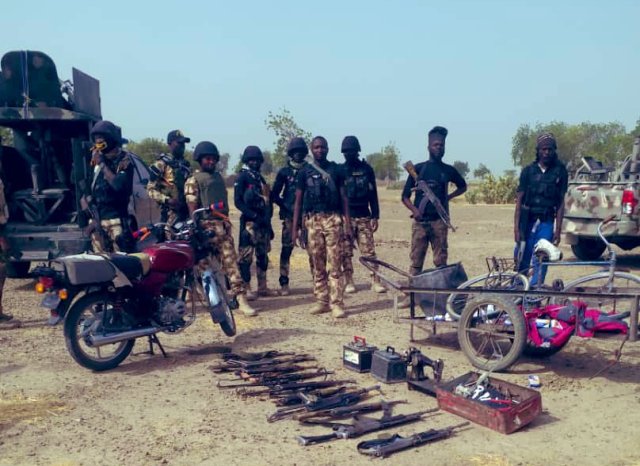 Nigerian army officers display the arms seized following a rescue operation in 2021. [photo: Nigerian army]
Nigerian army officers display the arms seized following a rescue operation in 2021. [photo: Nigerian army]
[This is an excerpt from an article in The Round Table: The Commonwealth Journal of International Affairs.]
On 2 April 2022 the governor of Kaduna state, Mallam Nasir El-Rufai, confirmed that based on intelligence reports, the attack on the train was indeed carried out by Boko Haram elements in collaboration with bandits operating in Kaduna, Sokoto, Niger, Kebbi and Zamfara states (Silas, 2022:1). He contended that ‘The families of those kidnapped have been contacted . . . But the gunmen haven’t shown any sign of collecting ransom. These ones aren’t the usual kidnappers but members of Boko Haram who are collaborating with bandits’.
Analysts have suggested that the ferocity and tempo of attacks in northwestern states are the trademark of Boko Haram insurgents. It is pertinent to note that, before the incursion of the terrorists, Fulani bandits operated in the region. However, the scale and precision of the current attacks suggest that the bandits have now received more logistical support, which makes the situation a lot more dire, more complex, and the acts in them much more sinister and debilitating. The particularly horrendous consequences of the Kaduna train attack could be felt on innocent families who had decided to commute through a channel deemed most secure of all transportation channels throughout the country, nursing the belief in their hearts that nothing could derail a moving train. Alas, they were wrong, as this attack left eight dead, over 20 persons injured and more than 100 others unaccounted for. There have been claims of a ransom of 100 million naira being paid by a high-ranking government official and about 50 million by another.
Nigeria and India both face threat of terrorism
Book review – Formation: the making of Nigeria from Jihad to Amalgamation
Nigeria: has the continent’s heavyweight become the sick man of Africa?
This situation is as devasting as it is terrifying. Government officials have in recent weeks been trading blame and passing the buck; however, this has not yielded any positive results in seeking to arrest the worrisome situation or rescuing the kidnapped victims from the clutches of these faceless elements.
It must be understood and appreciated that there is no one-size-fits-all solution to this war; nor is there a silver bullet to quell the crisis. It requires an all-hands-on-deck collective strategy of both conventional and non-conventional approaches, one that matches the dynamism of the threat posed by these bandits and terrorists. Is it public knowledge that addressing these kinds of situations requires a compartmentalisation of the response into two folds: the use of military might to decimate the terrorists (for which the Nigerian military architecture must rise to the occasion of restructuring its national defence strategy and national military strategy) and a clear-eyed look into the sociological motivations, including the ideological underpinnings, of the ordinary Nigerian and how they trigger actions such as these?
Therefore, the Nigerian government must as a matter of urgency mobilise and deploy the use of human and other forms of intelligence to gather information on the whereabouts of the terrorists, and activate the use of modern, lethal and sophisticated weapons to neutralise the threats. The need for the use of drones, fighter jets, laser-enabled equipment and other robotic and artificial intelligence at this point cannot be overemphasised. Kaduna state, which is a corridor and gateway to the country’s federal capital, must be seen to be fortified security-wise. All transportation channels must be walled with state-of-the-art security equipment and installations to forestall attacks of this nature. It is equally important that the president of Nigeria, by virtue of being the ‘commander in chief’ of the armed forces, empathise more with the victims of such attacks; this can be done through making state addresses or broadcasts on national television and cable channels, which will have a ripple effect as they will in turn boost the morale of the army and other security personnel and awaken their resolve to do more. They are fighting a war on multiple fronts and deserve nothing less than encouragement, commendation and applause from the highest quarters.
Ismail Bello is a Lecturer, Department of International Relations & Diplomacy, Baze University, Abuja, Nigeria and Mukhtar Imam is a Senior Lecturer & Dean, Faculty of Management Communications and Social Sciences, Pen Resource University, Gombe, Nigeria.



